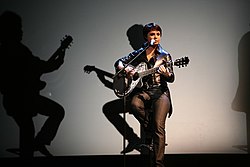4Fun | |
|---|---|
 4Fun performing the song Love or Leave in 2007 Eurovision | |
| Background information | |
| Genres | rock, pop rock, country |
| Years active | 2001–present |
| Members | Julija Ritčik (leader, vocals, acoustic guitar) Justas Jasenka (vocals, electric guitar) Rimantas Jasenka (bass guitar) Laimonas Staniulionis (percussion) |
| Past members | Tomas Valeika (bass guitar 2001–2006) Alexandr Litz (lead guitar 2001–2002) Artur Zaikovski (lead guitar 2002–2003) Andžej Zujevič (lead guitar 2003–2008) [1] |
| Website | http://www.4fun.lt/ |
4Fun (sometimes also Julia & 4Fun) [2] is a Lithuanian music band. They play a wide range of music styles, including rock, pop rock, and country. [3] The band was created in 2001 and participated in several national and international festivals, including Visaginas Country and the Eurovision Song Contest. [4]